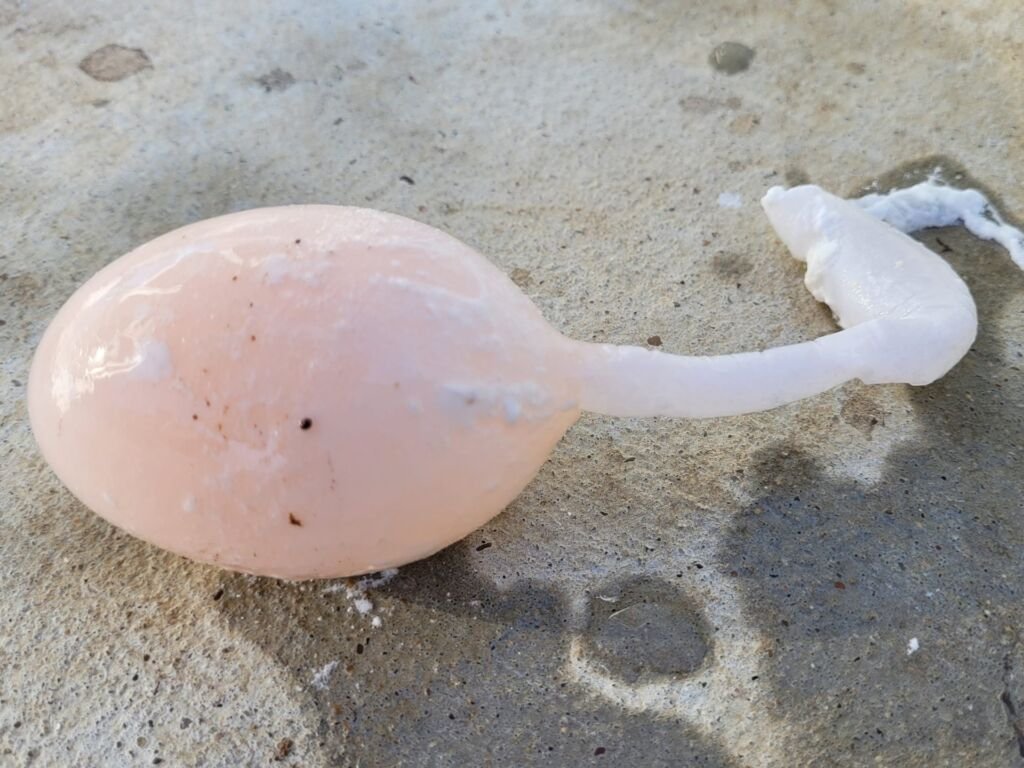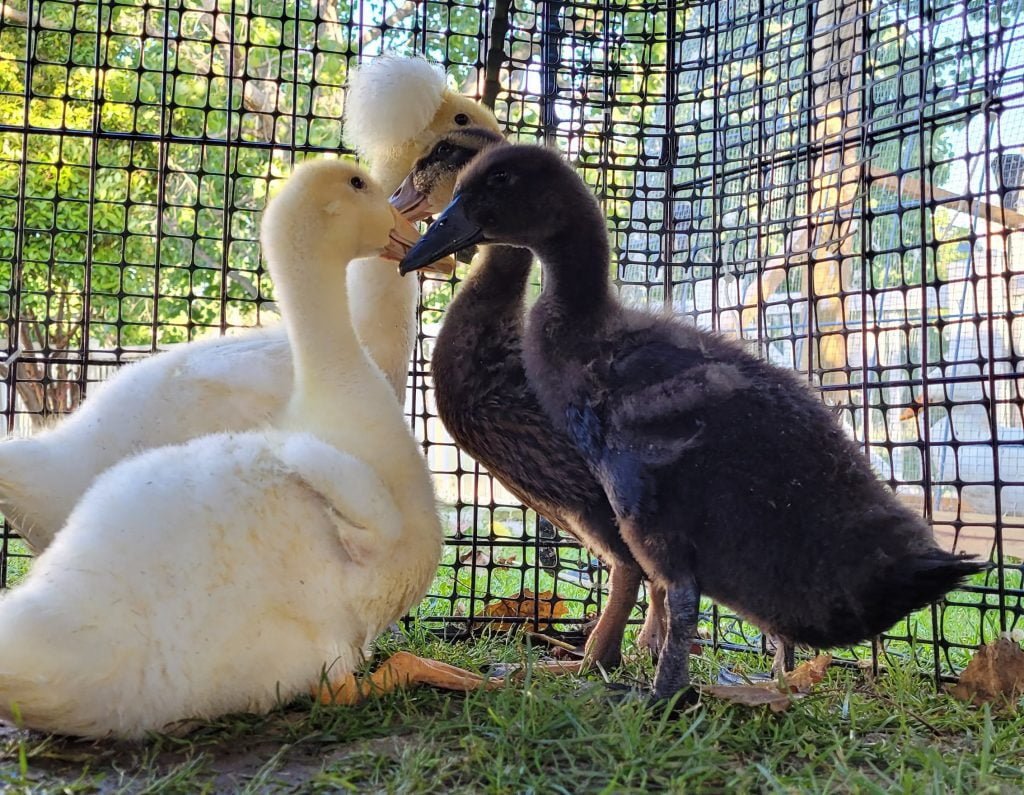Last updated on July 16th, 2024 at 06:29 pm
Male ducks (drakes) may sometimes experience a problem with their phallus sticking out. The prolapsed phallus is a condition in which male ducks cannot retract their phallus, leaving it exposed outside the body. An exposed penis is also called “penis paralysis,” “phallus prostration,” “penile prolapse,” or “protracted penis.”
This can be a painful and distressing condition for the duck and lead to infection if left untreated.
This article is part of our Duck Health Conditions Series.
We had this happen to our drake Simon and wanted to share what we have learned. Read his story here.
Disclaimer: I may earn a commission if you purchase products or services through my affiliate links. This does not affect the price you pay, and it helps me to continue creating content for you. I only recommend products and services that I believe in and that I think will be helpful to my readers.
The Normal Duck Penis
Drakes usually keep their penis inside their body, within a sac. They only get it out during mating. Interestingly, the duck penis is shaped like a corkscrew. Also fascinating is that they measure a third of the length of the duck’s body. [1]
During the mating ritual, the corkscrew penis shoots out within a third of a second into the female duck vagina, which spirals that curve in the opposite direction.
It is not unusual to see the tip of the penis hanging out after mating. But he usually fully retracts it within a few minutes.
Symptoms of a Prolapsed Duck Phallus
First and foremost, the penis of the drake is hanging out at the end of the duck’s digestive and reproductive tract longer than usual. If you see the tip of your drake’s penis continually exposed for a few hours or more, something is most likely wrong. The drake is not able to retract it on his own.
Several factors, including injury, infection, or inflammation, can cause this condition.
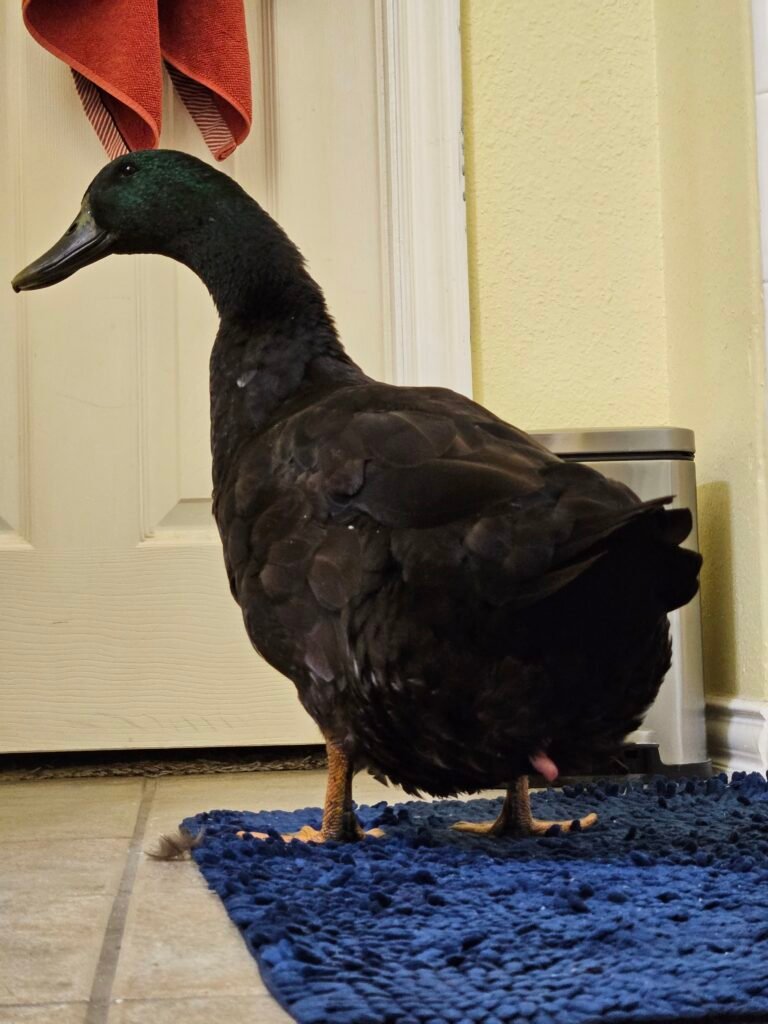
Physical signs of a prolapsed phallus in ducks include:
- Swelling, redness, and enlargement of the penis
- Dryness and ulcerations of the penis
- In advanced cases, the tissue may turn necrotic (die)
Behavioral signs of a prolapsed phallus in ducks include:
- Depression
- Self-imposed isolation
- Loss of appetite
- Lack of interest in mating or socializing with other ducks
Other possible signs of a prolapsed phallus in ducks include:
- Difficulty urinating or defecating
- Blood in the urine or feces
- Straining to urinate or defecate
- Licking or biting at the penis
If you notice these signs in your duck, you must immediately take them to the veterinarian. A prolapsed phallus is a severe condition that can be life-threatening if not treated promptly.

What Causes a Prolapsed Duck Phallus?
Multiple factors can increase the likelihood of a prolapsed duck penis.
You can help prevent prolapsed duck penis and maintain the health and well-being of their feathered companions by addressing these risk factors.
Improper handling during vent sexing
Vent sexing, the process of determining the gender of young ducks by examining their reproductive organs, requires delicate handling. Rough or inexperienced handling can cause internal damage, inflammation, and weakening of the tissues supporting the penis, making it more susceptible to prolapse.
Lack of clean swimming water
Ducks frequently submerge their cloaca (the common opening for the urinary, digestive, and reproductive tracts) into water for cleaning and lubrication. Stagnant and dirty water can harbor bacteria and parasites, leading to infections and inflammation of the cloaca and surrounding tissues, increasing the risk of prolapse.
Over-exertion during mating
Male ducks engage in frequent and vigorous matings during breeding. Excessive physical exertion, particularly in younger or less fit individuals, can strain the muscles, tendons, and ligaments supporting the penis, making it more prone to prolapse.
Infections
Bacterial, viral, or fungal infections can cause inflammation and weakening of the tissues surrounding the penis, increasing the likelihood of prolapse. These infections may spread through contaminated water, feces, or other ducks.
One example is the Duck Plague (DP) or duck viral enteritis (DVE), a severe and contagious disease caused by the alpha herpes virus anatid herpesvirus-1, which strikes ducks, geese, and swans of all ages.
Genetic predisposition
Certain duck breeds may have inherited traits that make them more susceptible to prolapse. These traits could include structural abnormalities of the penis or its supporting tissues, weakened connective tissues, or hormonal imbalances.
Old age
As ducks age, their bodies become less resilient and more prone to injuries and illnesses. The muscles, tendons, and ligaments supporting the penis may weaken with age, making it more susceptible to prolapse.
Bullying by other ducks or drakes
In crowded or stressful environments, dominant ducks or drakes may aggressively chase, peck, or attack weaker individuals. This bullying can cause physical injuries, including trauma to the cloaca and surrounding tissues, increasing the risk of prolapse.
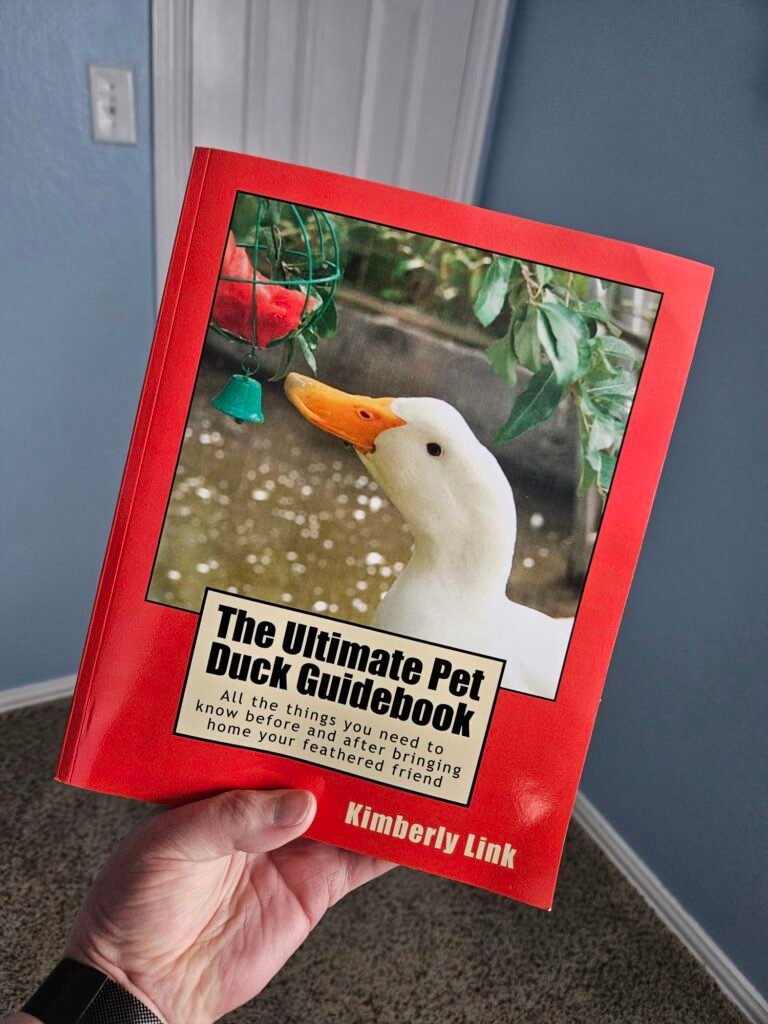
This is the BEST book about ducks I have ever had. I can highly recommend it to every duck owner, new or experienced. It is very comprehensive with pictures and illustrations. It covers all topics related to duck care (including prolapse in ducks) and keeping ducks. It even has multiple case studies.
How to Treat a Prolapsed Duck Phallus?
While a prolapsed phallus may seem alarming, it’s important to remain calm and take prompt action. You can help your drake overcome this challenge and restore his well-being with proper care and attention.
If you cannot resolve this at home in a reasonable time, it is crucial to seek veterinary attention. Here is a link to a poultry vet directory.
Here is a link to our Amazon Storefront, “First Aid Kit for Ducks” with helpful items.

Separate you Drake
Separate the duck from the other ducks, especially female ducks, to prevent arousal and further mating.
Isolating your drake from the rest of the ducks can help prevent pecking, primarily if it draws undue attention. This is because other ducks may peck at the protruding phallus, which can cause pain and infection.
Put your drake in a quiet, cozy, warm area (your own “duck intensive care unit”) where he can easily reach food and water to minimize stress.
We like to use playpens like the one in the picture below.
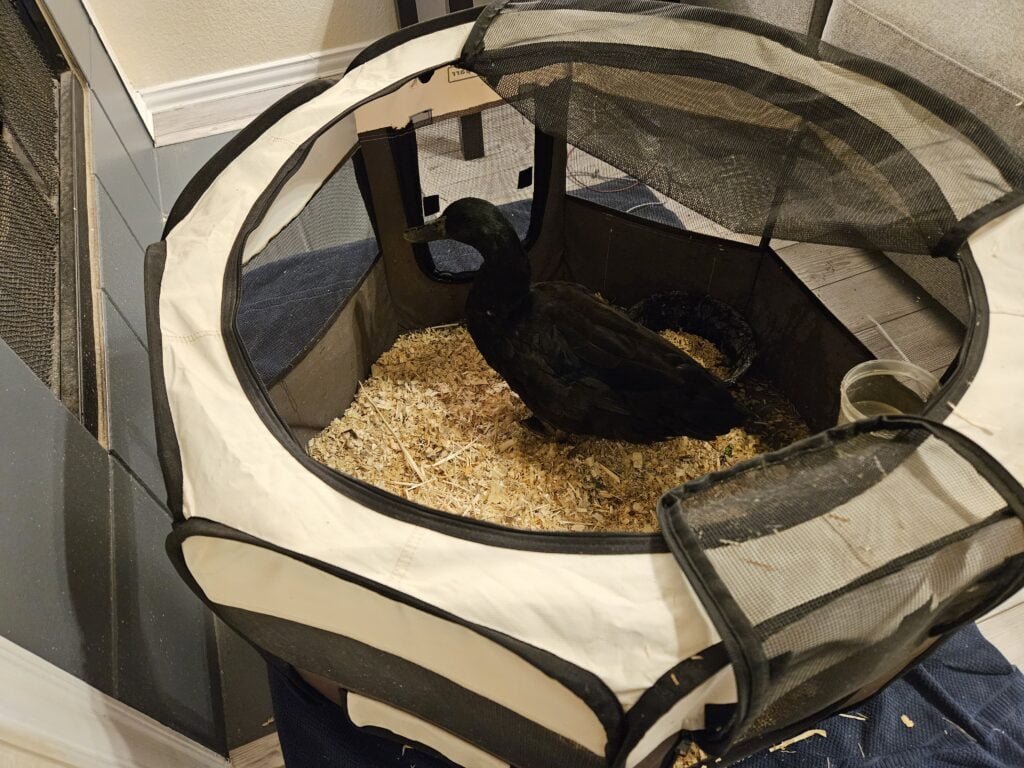
Swimming
You should immediately provide your drake with clean swimming water. A kiddie pool is a perfectly acceptable option. Relaxing in water can help reduce swelling and inflammation, making it easier for the phallus to retract into the body.
Clean water helps keep the area around the prolapsed phallus clean and bacteria-free, preventing infection.
In addition, cool water can also provide some relief from pain.
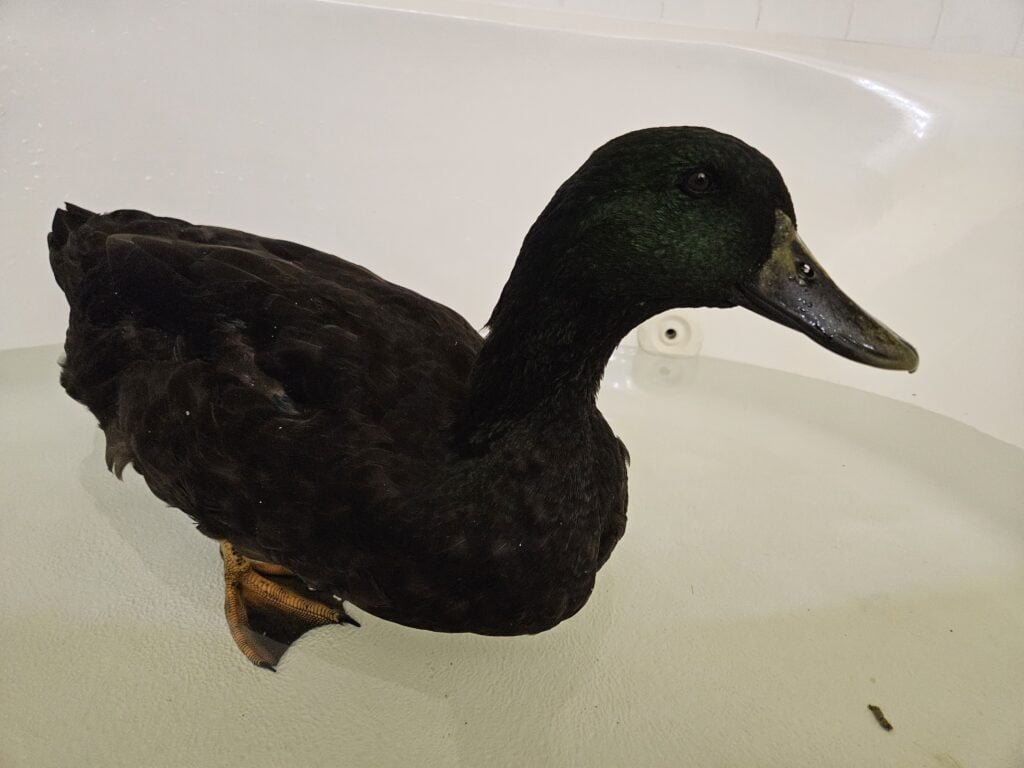
Cleanse and Lubricate
Thoroughly clean the prolapsed phallus with sterile saline solution. This helps remove any dirt, debris, or potential contaminants that could lead to infection.
Carefully remove any debris or foreign matter attached to the phallus. Use sterile cotton swabs or gauze to wipe away any stuck-on particles gently.
Once clean, gently lubricate the phallus with a sterile lubricant, such as KY Jelly or Vetericyn Hydrogel spray. Please do not use Vaseline, as this is not healthy for your duck.
Retract the Phallus
With clean, gloved hands, gently coax the phallus back into the cloaca, the opening where the phallus and vent are located. Use a lubricant (KY Jelly or Vetericyn Hydrogel spray). Be patient and apply minimal pressure to avoid causing discomfort.
Topical Treatments
You can apply a topical antibiotic cream to prevent infection. Choose a cream specifically formulated for veterinary use, as human medications may not be suitable for ducks.
Add a small amount of dimethyl sulfoxide (DMSO) gel to the affected area to reduce inflammation and swelling. DMSO is a natural compound with anti-inflammatory properties that can help soothe the phallus. [2]
If the superficial layer of the phallus appears necrotic (dead or dying), consider applying Manuka honey to the affected area. Manuka honey possesses antibacterial and healing properties that can aid in tissue regeneration.
Administer Antibiotics
As a precautionary measure, administer antibiotics to your drake to rule out any potential infection. Your veterinarian will prescribe the appropriate type and dosage of antibiotics for your duck.
Sutures
In some cases, the prolapsed phallus may be reduced manually so it can be gently pushed back into the body. However, if the prolapse is severe or the phallus is swollen or necrotic, sutures may be required to keep it in place.
In the case of a prolapsed phallus, the sutures will keep it inside the body and prevent it from prolapsing again. They will place the sutures at the cloaca.
The suturing procedure is typically performed under general anesthesia. This means the duck will be unconscious during the procedure and feel no pain.
The sutures will be removed after a few days or weeks once the phallus has healed and is no longer at risk of prolapsing again. Pos-operative care also includes administering pain medication to alleviate any discomfort the duck may experience and antibiotics to prevent infection.
It is important to note that suturing is not always a successful treatment for prolapsed phallus. In some cases, the phallus may prolapse again after the sutures are removed. However, suturing is often a successful treatment and can help to prevent further complications.
Do not under any circumstances attempt tying off of the affected part of the penis. This is painful, inhumane, and dangerous for the duck.
Amputation
In some severe cases of prolapsed duck phallus, amputation may be the only viable treatment option. This procedure involves surgically removing the prolapsed portion of the phallus, leaving the remaining healthy tissue intact.
Amputation is typically considered only when the phallus is significantly damaged, necrotic, or unable to be retracted back into the cloaca. It may also be recommended if the duck has experienced multiple prolapses and is at high risk of reoccurrence.
A veterinarian typically performs the amputation procedure under general anesthesia. [3] The affected area is thoroughly cleaned and sterilized, and the prolapsed phallus is carefully separated from the healthy tissue. The veterinarian then uses specialized surgical instruments to remove the damaged portion of the phallus, ensuring minimal bleeding.
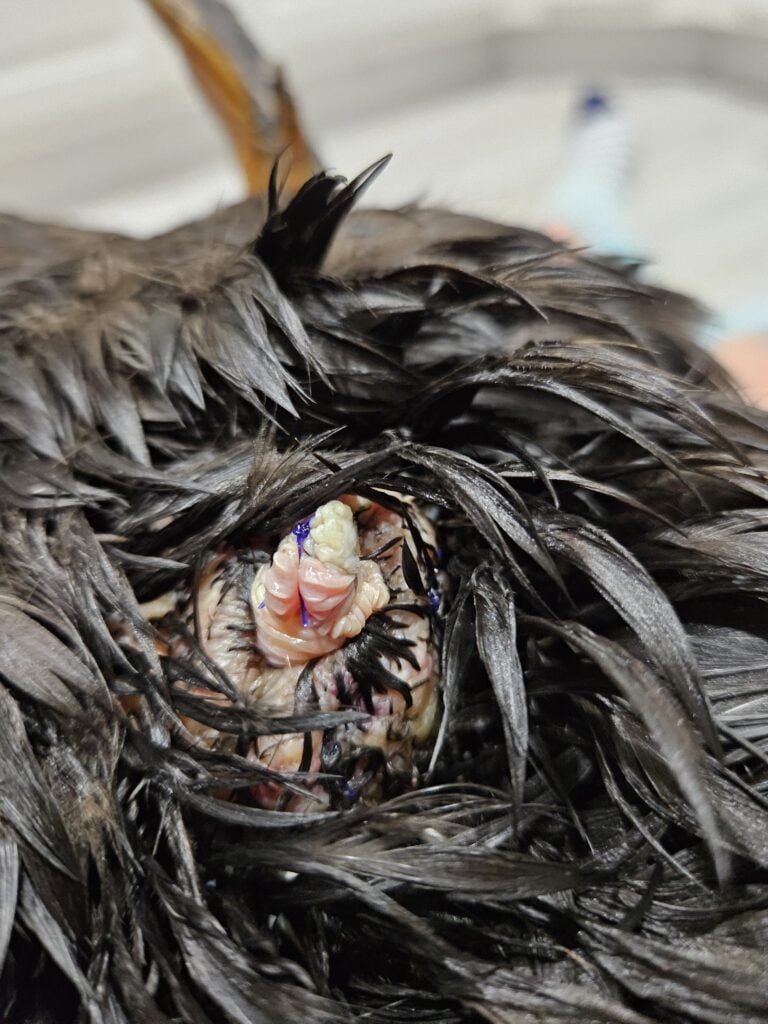
Never Attempt to Tie Off a Prolapsed Duck Phallus
Under no circumstances should you attempt to tie off the affected part of a duck’s prolapsed phallus. This practice is not only inhumane and causes immense pain to the duck but also poses serious health risks. Unfortunately, there is still a lot of misinformation about this floating around. Do not engage in this malpractice, and educate others if you come across this suggestion.
Reasons to Avoid Tying Off a Prolapsed Phallus
- Painful Procedure: Tying off a prolapsed phallus will inflict severe pain on the duck. The tight constriction of the phallus will restrict blood flow and cause tissue damage, leading to excruciating discomfort.
- Inhumane Treatment: Attempting to resolve a prolapsed phallus by tying it off demonstrates a disregard for the duck’s well-being. This method is cruel and unnecessary, causing undue suffering to the animal.
- Health Risks: Tying off a prolapsed phallus can lead to serious health complications, including:
- Necrosis: The restricted blood flow can cause the phallus tissue to die, resulting in necrosis.
- Infection: The open wound created by the tied-off phallus provides an easy entry point for bacteria, increasing the risk of infection.
- Gangrene: In severe cases, the lack of blood flow can lead to gangrene, a life-threatening condition that requires immediate amputation.
Related Posts:
- 16 Common Duck Health Conditions You Should Know About
- How we treated the prolapsed penis of our pet duck
References
[1] Brennan, P., Clark, C., & Prum, R. (2009). Explosive eversion and functional morphology of the duck penis supports sexual conflict in waterfowl genitalia. Proceedings of the Royal Society B: Biological Sciences DOI: 10.1098/rspb.2009.2139
[2] Duck DVM Website: https://duckdvm.com/condition/penis-prolapse
[3] Ersoz U. Okur S. Senocak M.G. Yanmaz L.E. Turgut F. Kocaman Y. Penile Prolapse in a Pekin Duck (Anas platyrhynchos domesticus).Kocatepe Vet J. (2021) 14(2): 274-277. Available from: https://www.researchgate.net/publication/350497363_Penile_Prolapse_in_a_Pekin_Duck_Anas_platyrhynchos_domesticus [accessed Nov 19 2023].


